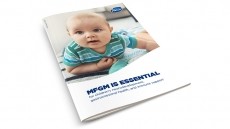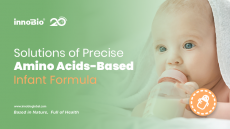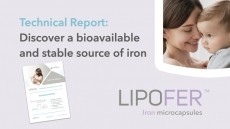Dietary choline in late pregnancy could boost babies' brain

Babies whose mothers had consumed 930 milligrams/ day (mg/d) of choline showed faster mean reaction times (RTs) averaged across the four test ages of four, seven, 10 and 13 months, found researchers from Cornell University, Ithaca, New York.
The enhanced information processing speeds and visiospatial memory performance were in comparison with babies whose mothers’ took 480mg/d of choline during the last trimester of pregnancy.
The small, randomised controlled trial of 26 women, published in The FASEB Journal, showed the amount of choline consumed by the lower intake group corresponded to just over the Adequate Intake (AI) level in pregnancy of 450 mg/d developed by the Food and Nutrition Board (FNB) of the Institute of Medicine (IOM).
“This result indicates that maternal consumption of approximately twice the recommended amount of choline during the last trimester improves infant information processing speed,” noted first author Professor Marie Caudill.
"In animal models using rodents, there's widespread agreement that supplementing the maternal diet with additional amounts of this single nutrient has lifelong benefits on offspring cognitive function.
“Our study provides some evidence that a similar result is found in humans." Caudill added.
Exposure time important
The researchers found that even with a prenatal choline intake of 480 mg/d, babies displayed improved RTs compared with typical intake levels for American women. The degree of improvement was closely linked to the amount of time they had been exposed to the higher level of choline as a foetus.
Previous research has indicated choline intake among pregnant women in U.S. is the range of 300-350 mg/d and that less than 25% achieve the AI of 450mg/d.
“Our findings also provide some support for a beneficial effect of consuming 480mg choline/d, relative to women’s usual choline intake,” the researchers explained.
“For the 480-mg choline/d group, there was a significant linear effect of exposure duration (infants exposed longer showed faster RTs), suggesting that even modest increases in maternal choline intake during pregnancy may produce cognitive benefits for offspring.”
Choline containing foods
Choline-rich foods include egg yolks, liver, red meat, fish and poultry, while vegetarian sources include legumes, nuts and cruciferous vegetables.
Some current dietary trends have led to women avoiding some of the best sources of choline, suggested study leader Professor Richard Canfield, as a possible explanation for the low intake levels
In the past, egg consumption has been suggested to lead to higher blood cholesterol levels, even though this theory has subsequently been widely disproven. Additionally, “Health professionals, including those in the government, have raised caution about pregnant women consuming undercooked eggs, which may deter women from eating them altogether,” commented Canfield.
Fears about the saturated fat content of meat may also have led to avoidance of a prime source of choline.
In this study, the scientists used a combination of dietary and supplemental choline to achieve the specified doses. A tightly controlled standard diet was used to provide 380 mg of the daily intake, while the women were randomised to receive a further supplement of either 100 or 550 mg/d in a juice-based drink.
Public health implications
The result that a choline intake of twice the AI produced such significant benefits in cognitive performance may have implications for choline supplementation policy, the researchers argued.
“This finding suggests that the current AI level for choline during pregnancy may need to be increased for improved offspring cognitive functioning.
“In addition, our results provide evidence that maternal consumption of the AI of choline during this period also produces benefits relative to typical choline intake among pregnant women. If the benefits we report are lasting and are enabled through improved brain structure and function, as has been shown in the rodent studies, then increasing maternal choline intake could be a nutritional strategy for improving offspring cognition throughout life.”
Substantial further research is required to identify and quantify the long-term benefits of improving choline status, but they could be substantial, the researchers conclude.
“Longitudinal studies that extend beyond infancy and incorporate multiple measures of cognition are needed to further explore this question in humans.
“Although the effects of increased maternal choline intake are expected to be small at an individual level, they are anticipated to be substantial at a societal level, including population-wide improvements in cognitive function and reduced incidence of aging-related cognitive decline.”
Source: The FASEB Journal
Published online, doi: 10.1096/fj.201700692RR
“Maternal choline supplementation during the third trimester of pregnancy improves infant information processing speed: a randomized, double-blind, controlled feeding study”
Authors: Marie A. Caudill, et al














